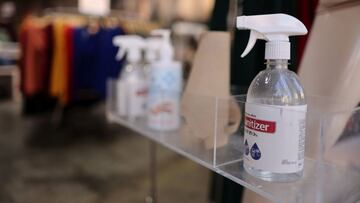New study reveals alcohol-free hand gels kill coronavirus
A recent study has revealed that gels which don't contain alcohol have the same benefits, even though they don’t produce the familiar "burn" sensation.

Ever since the pandemic began, health authorities have emphasised the importance of hand hygiene to fight against the spread of covid-19. In order to kill the virus it's been broadly recommended that we wash our hands regularly with soap and water for at least 20 seconds. The option on the go is to use alcoholic hand sanitizing gel, especially after touching surfaces that could be contaminated. What’s more, it’s long been advised by many health authorities that not every available hand sanitizing gel is effective in killing the novel coronavirus, in fact they must carry at least 60-70% alcohol.
Now a recent study has challenged that theory. A team of researchers at Brigham Young University in the US has proven that alcohol-free sanitizers are just as effective at killing the coronavirus on surfaces as those that contain alcohol.
"Our results indicate that alcohol-free hand sanitizer works just as well, so we could, maybe even should, be using it to control covid-19,” explained Benjamin Ogilvie, the lead author of the study.
A new Brigham Young University study, recently published in The Journal of Hospital Infection, finds that alcohol-free hand sanitizer is just as effective as alcohol-based products as a disinfectant of the COVID-19 virus.https://t.co/0EhBzXkV81
— KUTV2news (@KUTV2News) December 3, 2020
Benzalkonium chloride and quaternary ammonium
In the paper, published in the Journal of Hospital Infection, the researchers tested samples of the coronavirus (or SARS-CoV-2) with benzalkonium chloride, an active ingredient commonly used in alcohol-free hand gels. They also tested several other quaternary ammonium compounds (Quats) which are often found in disinfectants. In the majority of tests, the compounds eliminated at least 99.9% of the virus within 15 seconds of contact.
Given that benzalkonium chloride usually works well against viruses surrounded by lipids, like that of SARS-CoV-2, the research team tested the hypothesis that those compounds could indeed inactivate coronavirus cells. In the course of the research Ogilvie and his team put samples of the virus in test tubes and then mixed it with different compounds, including a 0.2% benzalkonium chloride solution, as well as three commercially available disinfectants that contain quaternary ammonium compounds. They found that all four successfully deactivated the virus even in the presence of a soil load - with dirt already present on the surface - or when diluted in hard water.
The team worked quickly to simulate a real-world environment, where gel is expected to kill viruses rapidly to be considered effective. They neutralised the disinfectant compounds, extracted the virus from the tubes and placed the particles of the virus on living cells. The virus failed to invade and kill the cells, indicating that the compounds had deactivated them.
Advantages of alcohol-free products
Alcohol-free hand sanitizers - which are also effective in killing common cold and flu viruses – carry several advantages over those containing alcohol, according to the researchers; “benzalkonium chloride can be used in much lower concentrations and does not cause the familiar “burn” feeling you might know from using alcohol sanitizer. It can make life easier for people who have to sanitize hands a lot, like healthcare workers, and maybe even increase compliance with sanitizing guidelines,” they noted.
Related stories
What’s more, they added that to change to an alcohol-free hand sanitizer is logistically simple; “people were already using it before 2020," said BYU professor and co-author Brad Berges. "It just seems like during this pandemic, the non-alcohol-based hand sanitizers have been thrown by the wayside because the government was saying, 'we don't know that these work,' due to the novelty of the virus and the unique lab conditions required to run tests on it."
The team believe that their findings "may actually provide a change in government directions about hand sanitizer." Ogilvie hopes that the reintroduction of alcohol free hand sanitizer can relieve shortages and reduce the possibility of people encountering some potentially "sketchy" alcohol sanitizers that have cropped up in response to the demand.


